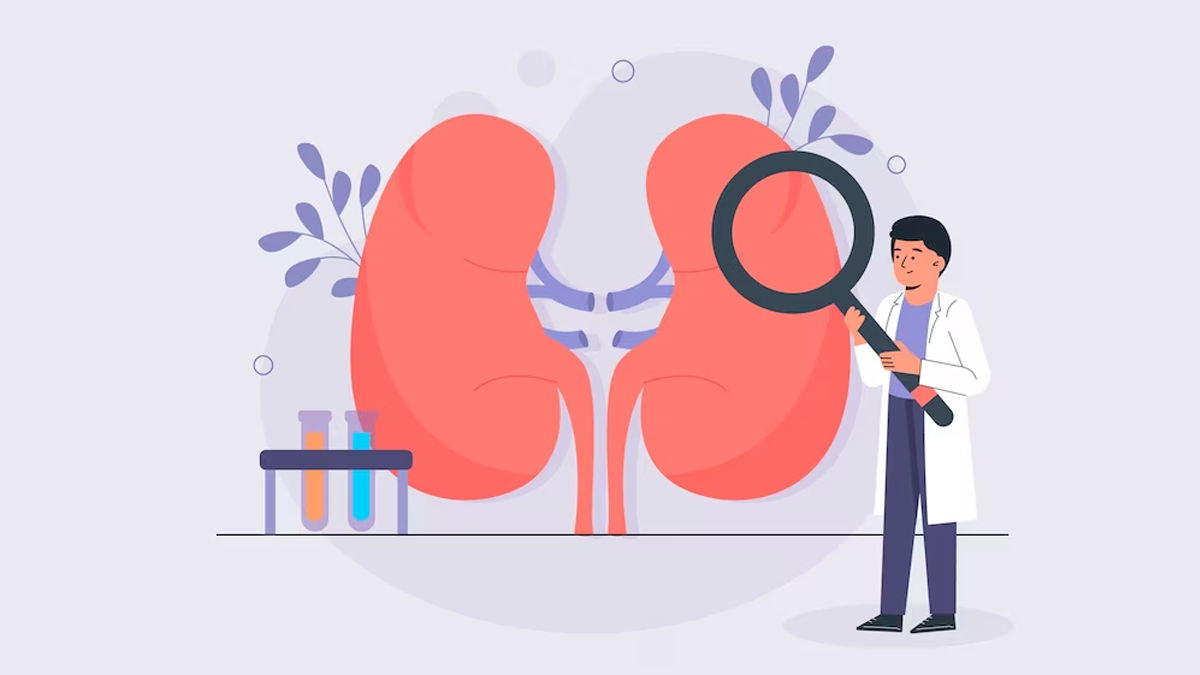
Kidney diseases have emerged as a silent global epidemic, impacting millions of lives worldwide. According to the National Kidney Foundation, chronic kidney disease affects 10% of the population worldwide and is responsible for millions of deaths every year. We spoke to our expert Dr Rajasekara Chakravarthi Madarasu, Consultant Nephrologist, Clinical Director and HoD Of Nephrology And Transplant Services, Yashoda Hospitals, Hyderabad, who explained the role of kidneys, stages of kidney disease, and how it can be prevented.
Role of Kidneys

Dr Madarasu said, “The kidneys are remarkable organs, each about the size of a fist, situated on either side of the spine, beneath the rib cage.” They are vital for maintaining overall health and play several important roles in the body, such as:
Filtration and Excretion
The primary function of the kidneys is to filter waste products and excess substances, primarily urea, creatinine and various salts, out of the blood. These waste materials are then excreted as urine, which is transported to the bladder for eventual elimination from the body.
Blood Pressure Regulation
Kidneys help regulate blood pressure by controlling the volume of blood circulating in the body. They can constrict or dilate blood vessels, influencing blood pressure levels.
Electrolyte Balance
Dr Madarasu added, “Balancing electrolytes, such as sodium, potassium and calcium is another critical function. The kidneys ensure that these ions are at optimal levels, which is crucial for nerve function, muscle contractions and maintaining proper pH levels in the body.”
Acid-Base Balance
Kidneys help maintain the body's acid-base balance by excreting hydrogen ions and reabsorbing bicarbonate ions, thus stabilising the blood's pH level.
Also Read: From Managing Weight To Avoiding Smoking: Dos and Don'ts for People With Kidney Disease
What are Kidney Diseases
Kidney diseases are conditions that affect the structure and function of the kidneys. These diseases can lead to impaired kidney function, which can result in various health problems. There are different kidney diseases and are classified into stages based on their severity.

Acute Kidney Injury (AKI)
- Stage 1 - Mild
- Stage 2 - Moderate
- Stage 3 - Severe
Dr Madarasu said, “Acute Kidney Injury (AKI), also known as acute renal failure, is a condition characterised by a sudden and rapid loss of kidney function. AKI is classified into stages based on the severity of kidney damage and these stages help healthcare professionals determine the appropriate treatment and management.”
Stage 1
In this stage, there is a higher risk of developing AKI, but kidney function is still relatively normal.
- Criteria may include an increase in serum creatinine by at least 0.3 mg/dL within 48 hours.
- Urine output may also be a consideration, with a decrease in urine output (oliguria) to less than 0.5 mL/kg/hour for 6-12 hours.
Stage 2
Dr Madarasu said, “Kidney function is moderately impaired and it may be a sign of kidney damage.”
- Criteria may include an increase in serum creatinine to 2.0-2.9 times baseline within seven days.
- Urine output may further decrease, i.e., 0.5 mL/kg/hour for 6-12 hours.
Stage 3 - Failure
This is the most severe stage of AKI, with significant kidney damage.
- Criteria include a serum creatinine increase to 3.0 times baseline or more or an increase to a level greater than 4.0 mg/dL.
- Urine output may continue to decrease, with oliguria persisting for more than 24 hours or anuria (no urine output) for more than 12 hours.
Chronic Kidney Disease (CKD)

Dr Madarasu said, “The stages of CKD are typically categorised into five stages based on a patient's estimated glomerular filtration rate (eGFR), which measures how well the kidneys are filtering waste from the blood.”
- Stage 1 - GFR >90 ml
- Stage 2 - GFR 60-89 ml
- Stage 3 - GFR 30-59 ml
- Stage 4 - GFR 15-29 ml
- Stage 5 - <15ml
Stage 1: Kidney damage with normal eGFR (>90ml)
In this stage, there is evidence of kidney damage, such as abnormal urine tests or kidney imaging, but the eGFR is normal or only slightly reduced. Kidney function is still considered adequate.
Stage 2: Mildly reduced eGFR (60-89ml)
Kidney function is moderately reduced in this stage, but the patient may not yet experience noticeable symptoms. It is often asymptomatic.
Stage 3: Moderately reduced eGFR (30-59ml)
Kidney function is significantly reduced and patients may start to experience symptoms like fatigue, swelling or changes in urine output.
Stage 4: Severely reduced eGFR (15-29ml)
Kidney function is greatly diminished and patients are at a high risk of experiencing complications. Symptoms may become more severe and medical intervention is often necessary.
Stage 5: Kidney failure (End-Stage Renal Disease, ESRD)
In this final stage, the kidneys are no longer able to perform their essential functions adequately. Patients with ESRD require kidney replacement therapy, such as dialysis or a kidney transplant, to survive.
According to the HHS Public Access, preventing adverse CKD-related outcomes, such as cardiovascular disease, end-stage kidney disease, and death, requires appropriate screening, diagnosis, and management by primary care providers.
Also Read: High Fever To UTI: Here're 6 Symptoms Of Kidney Stones You Should Not Ignore
Other kidney diseases

- Polycystic Kidney Disease: (PKD)
- Glomerulonephritis
- Kidney stones
- Nephrotic Syndrome
- Pyelonephritis
Polycystic Kidney Disease (PKD)
Dr Madarasu said, “PKD is a genetic disorder characterised by the formation of numerous fluid-filled cysts within the kidneys. These cysts can enlarge over time, impairing kidney function and leading to complications such as hypertension and kidney stones.”
Glomerulonephritis
Glomerulonephritis refers to a group of diseases that cause inflammation and damage to the glomeruli, the tiny filtering units in the kidneys. This can lead to impaired filtration and various symptoms, including proteinuria and hematuria.
Kidney Stones
Hard deposits of minerals and salts known as kidney stones can develop in the kidneys. They can cause excruciating pain when they move through the urinary tract.
Nephrotic Syndrome
Nephrotic syndrome is a condition characterised by excessive protein excretion in the urine, leading to oedema (swelling), hypoalbuminemia and hyperlipidemia.
Pyelonephritis
Dr Madarasu added, “A bacterial infection of the kidneys known as pyelonephritis frequently results from untreated urinary tract infections. It can lead to kidney scarring and long-term damage if not promptly treated.”
How To Prevent Kidney Diseases
Preventing kidney diseases is a critical aspect of maintaining overall health and well-being. Dr Madarasu listed measures you should follow to reduce the risk of kidney-related complications:

Maintain a Healthy Lifestyle
- Balanced Diet: Consume a diet rich in fruits, vegetables, whole grains and lean proteins. Limit salt and processed foods as excessive sodium intake can raise blood pressure and strain the kidneys.
- Hydration: It is important to drink an adequate amount of water as proper hydration supports optimal kidney function and helps prevent kidney stones.
- Limit Sugar and Sugary Drinks: High sugar intake can contribute to diabetes and obesity, both of which increase the risk of kidney disease.
- Moderate Alcohol Consumption: Excessive alcohol can harm the kidneys. Limit alcohol intake to moderate levels (one drink per day for women, two for men).
- Avoid Smoking: Smoking damages blood vessels, including those in the kidneys and can worsen kidney function.
Manage Underlying Conditions
- Control Blood Pressure: High blood pressure is a leading cause of kidney disease. Monitor your blood pressure regularly and work with your healthcare provider to keep it within a healthy range.
- Manage Diabetes: Properly manage diabetes through medication, lifestyle changes and regular check-ups to prevent diabetic nephropathy, a common cause of kidney damage.
- Regular Check-ups: Schedule routine check-ups with your healthcare provider. Early detection of kidney disease and its risk factors can lead to timely interventions.

Reducing salt intake
It is a critical step in preventing kidney diseases. Excessive salt consumption can elevate blood pressure, strain the kidneys and contribute to the formation of kidney stones. Staying hydrated also helps flush out excess sodium. By practising salt restriction, one can safeguard your kidney health, manage blood pressure and lower the risk of kidney-related complications.
Avoid Nephrotoxic Substances
- Over-the-counter pain Medications: Limit the use of non-prescription pain relievers like ibuprofen and naproxen, as prolonged or excessive use can damage the kidneys.
- Prescription Medications: Follow your doctor's instructions when taking prescription medications, especially if they have potential kidney-related side effects.
- Chemical Exposure: Be cautious when handling chemicals and toxins, such as cleaning agents and solvents and use protective gear as needed.
Adopt a Healthy Lifestyle
- Maintain a Healthy Weight: Obesity increases the risk of kidney disease, so aim for a healthy body weight through regular exercise and a balanced diet.
- Regular Physical Activity: Engage in regular physical activity to help maintain a healthy weight, control blood pressure and improve overall cardiovascular health.
- Stress Management: Chronic stress can negatively impact kidney function. Hence, practise stress-reduction techniques, such as meditation, yoga or deep breathing exercises.
[Disclaimer: This article contains information provided by a registered healthcare professional and is for informational purposes only. Hence, we advise you to consult your expert for a treatment plan to avoid further complications.]







